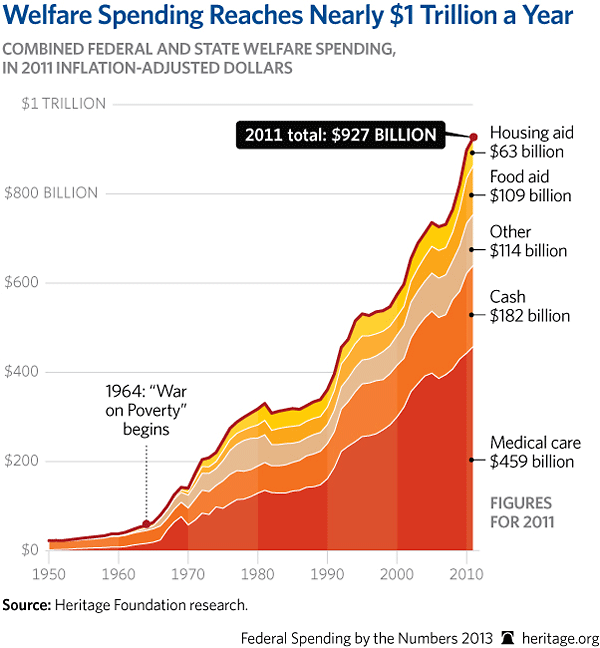This tweet yesterday from Elon Musk went hugely viral:

According to the comments on Reddit and Twitter, by my estimate 90% are in agreement. The SJW-left (in contrast to the classical-liberal left) don’t understand that it’s the rich who create jobs. [1] That’s just an inescapable part of economic reality. But the good news is, judging by the comments and up-votes, 90% of people understand this, and this is further evidence that the left’s narrative is losing traction. Young people, millennials aspire to be like Elon Musk, not to resent or envy his success.
Here are some of the most common counter-arguments, which I will refute
“Elon Musk is hoarding his wealth, that could be spent elsewhere”
This is a common argument, and indeed Elon Musk has a lot of wealth that is tied up in his shares of Tesla and other projects. But Elon’s wealth–all $20 billion of it–would barely put a dent in terms of entitlement spending, which has recently eclipsed a trillion dollars a year:

So even if Musk’s wealth were forcibly confiscated and redistributed, it wouldn’t be enough. In fact, the combined wealth of the Forbes 400 would only cover a year of America’s annual budgetary expenditures. A hugely successful company such as Microsoft or Apple generates far more economic value in terms of tax revenue and employee purchasing power than the personal wealth of the founders, as discussed in further detail in the post The Misplaced Logic of Attacking the Rich. It’s in the best interests of everyone, including the poor, who are dependent on social programs paid for by wealthy, to let the most productive members of society keep what they earn.
Trying to prove the Elon’s wealth could be better spent elsewhere is like trying to prove a negative. In theory , maybe it could, but there is no way of determining this, and even if it could be spent efficaciously, the forcible confiscation of wealth would have far greater negative consequence than any utility that would come from its re-appropriation.
Because Elon’s wealth is in Tesla stock, wealth confiscation would be tantamount to government partial ownership of Tesla.
“He’s too powerful”
One could make the argument that rich people have too much power in politics, and perhaps that is a valid point, but if billionaires and the wealthy, in general, are so powerful, why do wealthy politicians have to work so hard to pander to ‘middle America’. Barrack Obama, despite only having a few dollars of net-worth in 2008, defeated the far wealthier and better-connected Hillary Clinton. And in 2012 he defeated the even wealthier Mitt Romney. Same for Jeb Bush, who fared the most poorly in the 2016 GOP primaries despite spending the most money on campaigning. Rather, the wealthy have a lot of power in their domains, such as Mark Zuckerberg having a lot of power in the field of social networking, but such power is much harder to transfer to politics and policy.
“the money was wasted”
This criticism refers to Tesla’s $500 million government loan as a consequence of the 2008 auto bailout. Although I opposed the bailouts, Tesla’s success is demonstrative of how government funding for high-IQ initiatives can generate huge ROIs and how the public sector can complement the private one, in ways that would not be possible under a purely free market system. Musk took a $500 million loan (and prob. some other VC funding), which he paid back, and turned it into a $40+ billion dollar business that has created thousands of job and spurred innovation. Given that the loan was paid back, it was effectively free job creation (minus some opportunity cost). Also, debt and capitalism are insuperable–that’s why banks exist.
“Tesla is a ‘house of cards’…their business is losing tons of money”
The left has been using that line for years, all while Tesla stock has continued to go up anyway. There is more to the picture than Tesla’s debt.
The reality is, Tesla is profitable on a cash flow basis, and their earnings are growing rapidly. Tesla profit margins are 20%, vs. 5-10% for Ford and GM. The losses are due to one-time capital expenditures such as factories. Remove those things and Tesla is profitable. I discuss this in more detail here.
[1] More specially, it’s not that the wealth creates jobs, but rather having a high personal net-worth is typically a direct consequence of running a successful, large business. But also, wreath is used to invest in businesses, such as venture capital. A famous example is Peter Theil, who in 2005 invested $500,000 of his own money into a fledgling company named Facebook, turning his investment into billions.